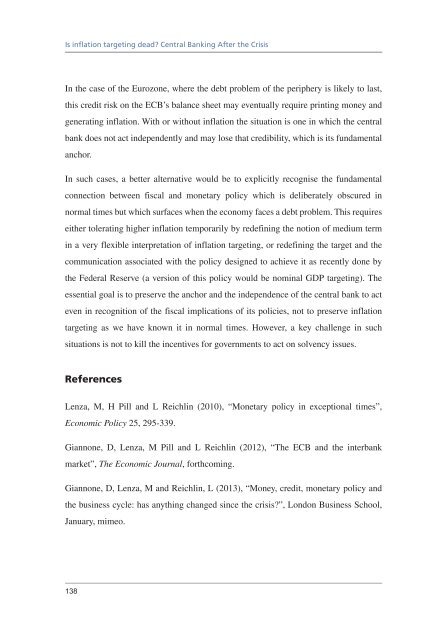Is inflation targeting dead? Central Banking After the Crisis - Vox
Is inflation targeting dead? Central Banking After the Crisis - Vox
Is inflation targeting dead? Central Banking After the Crisis - Vox
Create successful ePaper yourself
Turn your PDF publications into a flip-book with our unique Google optimized e-Paper software.
<strong>Is</strong> <strong>inflation</strong> <strong>targeting</strong> <strong>dead</strong>? <strong>Central</strong> <strong>Banking</strong> <strong>After</strong> <strong>the</strong> <strong>Crisis</strong>In <strong>the</strong> case of <strong>the</strong> Eurozone, where <strong>the</strong> debt problem of <strong>the</strong> periphery is likely to last,this credit risk on <strong>the</strong> ECB’s balance sheet may eventually require printing money andgenerating <strong>inflation</strong>. With or without <strong>inflation</strong> <strong>the</strong> situation is one in which <strong>the</strong> centralbank does not act independently and may lose that credibility, which is its fundamentalanchor.In such cases, a better alternative would be to explicitly recognise <strong>the</strong> fundamentalconnection between fiscal and monetary policy which is deliberately obscured innormal times but which surfaces when <strong>the</strong> economy faces a debt problem. This requiresei<strong>the</strong>r tolerating higher <strong>inflation</strong> temporarily by redefining <strong>the</strong> notion of medium termin a very flexible interpretation of <strong>inflation</strong> <strong>targeting</strong>, or redefining <strong>the</strong> target and <strong>the</strong>communication associated with <strong>the</strong> policy designed to achieve it as recently done by<strong>the</strong> Federal Reserve (a version of this policy would be nominal GDP <strong>targeting</strong>). Theessential goal is to preserve <strong>the</strong> anchor and <strong>the</strong> independence of <strong>the</strong> central bank to acteven in recognition of <strong>the</strong> fiscal implications of its policies, not to preserve <strong>inflation</strong><strong>targeting</strong> as we have known it in normal times. However, a key challenge in suchsituations is not to kill <strong>the</strong> incentives for governments to act on solvency issues.ReferencesLenza, M, H Pill and L Reichlin (2010), “Monetary policy in exceptional times”,Economic Policy 25, 295-339.Giannone, D, Lenza, M Pill and L Reichlin (2012), “The ECB and <strong>the</strong> interbankmarket”, The Economic Journal, forthcoming.Giannone, D, Lenza, M and Reichlin, L (2013), “Money, credit, monetary policy and<strong>the</strong> business cycle: has anything changed since <strong>the</strong> crisis?”, London Business School,January, mimeo.138














